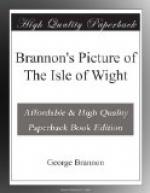militia expelled the weak garrison of Carisbrooke
Castle, which, with the other forts, were delivered
to the parliamentary troops; and on the arrival
of the Earl of Pembroke, the gentlemen and principal
farmers assembled at Cowes, and tendered him their
best services. The inhabitants having thus
taken a decisive step in closing with the prevailing
power, remained undisturbed spectators of the ensuing
commotions, till the king injudiciously sought here
an asylum.
On the 12th of November, 1647, Charles, who had just fled from Hampton Court, was met at Tichfield by Colonel Hammond, governor of the Isle of Wight, who invited him to take up his residence at Carisbrooke Castle. The offer was accepted, and for some time the royal guest appeared to be quite free and unrestrained in his actions and company; but afterwards his liberty was gradually abridged, his confidential servants removed, and himself imprisoned within the castle; the various unsuccessful attempts that were made to effect his escape only serving as a pretext to increase the rigor of his confinement. Yet during the subsequent negociations of the Treaty of Newport, he was set at large on his parole,—till a detachment of the army broke off the negociations by arresting and conveying him to Hurst Castle; 30 days before he lost his life at Whitehall.
As its situation preserved it from scenes of hostility between the troops, the island enjoyed a much happier state than any other part of the kingdom during the civil war, which caused many families to retire hither: a circumstance that for the time rose the farm-rents in the proportion of 20 per cent. The subsequent local history presents nothing of any interest, with the exception perhaps of the powerful armaments which assembled in the neighbourhood during the last French war, and the large bodies of military which were in consequence here quartered.
The absolute lordship of the Isle of Wight was given by William the Conqueror to one William Fitz-Osborne (in reward for his services at the battle of Hastings), “to be held by him as freely as he himself held the realm of England”; but in consequence of the defection of his descendant, it was resumed by the Crown. Henry I granted it to the Earl of Devon, in whose family it long continued, till the alienation of it was obtained by Edward I, for a comparatively small sum. The last grant was to Edward de Woodville in 1485; from which time there have been successively appointed by the Crown,—wardens, captains—and governors of the island: but the powers attached to the office have gradually declined, and at present it is a mere title, unaccompanied by duty or, we believe, emolument.—It is an amusing circumstance in the history of this little spot, that it had once the high-sounding honor of having a King of its own!—for the Duke of Warwick was so crowned by the hands of Henry VI, in the year 1444,—but it would seem that the glory of the name was all which his Vectis Majesty derived from his accession.
* * * * *




